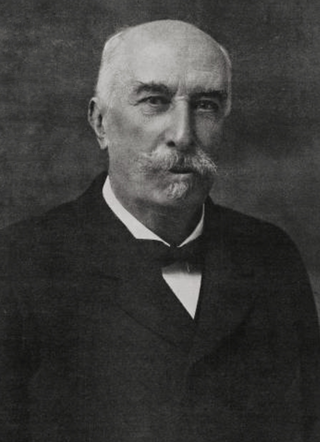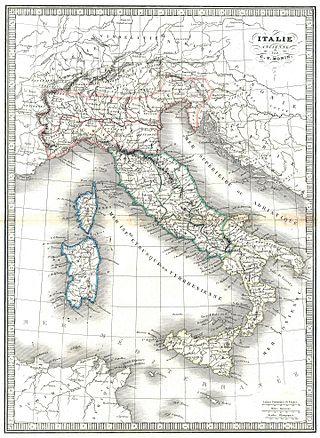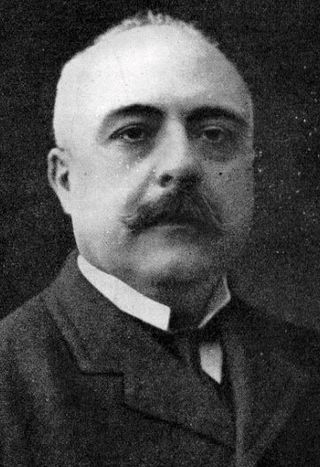
The Prime Minister of Italy, officially the President of the Council of Ministers, is the head of government of the Italian Republic. The office of president of the Council of Ministers is established by articles 92–96 of the Constitution of Italy; the president of the Council of Ministers is appointed by the president of the Republic and must have the confidence of the Parliament to stay in office.

Giovanni Giolitti was an Italian statesman. He was the Prime Minister of Italy five times between 1892 and 1921. After Benito Mussolini, he is the second-longest serving Prime Minister in Italian history. A prominent leader of the Historical Left and the Liberal Union, he is widely considered one of the most powerful and important politicians in Italian history; due to his dominant position in Italian politics, Giolitti was accused by critics of being an authoritarian leader and a parliamentary dictator.

The March on Rome was an organized mass demonstration and a coup d'état in October 1922 which resulted in Benito Mussolini's National Fascist Party (PNF) ascending to power in the Kingdom of Italy. In late October 1922, Fascist Party leaders planned an insurrection to take place by marching on the capital. On 28 October, the fascist demonstrators and Blackshirt paramilitaries approached Rome; Prime Minister Luigi Facta wished to declare a state of siege, but this was overruled by King Victor Emmanuel III, who, fearing bloodshed, persuaded Facta to resign by threatening to abdicate. On 30 October 1922, the King appointed Mussolini as Prime Minister, thereby transferring political power to the fascists without armed conflict. On 31 October the fascist blackshirts paraded in Rome, while Mussolini formed his coalition government.

This articles covers the history of Italy as a monarchy and in the World Wars.

Antonio Salandra was a conservative Italian politician who served as the 21st prime minister of Italy between 1914 and 1916. He ensured the entry of Italy in World War I on the side of the Triple Entente to fulfil Italy’s irredentist claims.

Alessandro Fortis was an Italian politician who served as the 18th prime minister of Italy from 1905 to 1906.

Tommaso Tittoni was an Italian diplomat, politician and Knight of the Annunziata. He was Italy's foreign minister from 1903 until 1909, except for a five-month period. He also was interim prime minister for about two weeks in March 1905, making him the shortest-serving prime minister in the history of Italy.

Antonio Giolitti was an Italian politician and cabinet member. He was the grandson of Giovanni Giolitti, the well-known liberal statesman of the pre-fascist period who served as Prime Minister of Italy five times.

The Ministry of the Colonies was the ministry of the government of the Kingdom of Italy responsible for the governing of the country's colonial possessions and the direction of their economies. It was set up on 20 November 1912 by Royal Decree n. 1205, turning the Central Direction of Colonial Affairs within the Ministry for Foreign Affairs into a separate ministry. Royal Decree n. 431 of 8 April 1937 renamed it the Ministry of Italian Africa after the Second Italo-Ethiopian War, which resulted in the Italian annexation of the Ethiopian Empire and the birth of Italian East Africa. It was suppressed on 19 April 1953 by law n. 430.
General elections were held in Italy on 7 March 1909, with a second round of voting on 14 March. The "ministerial" left-wing bloc remained the largest in Parliament, winning 329 of the 508 seats.
Events from the year 1893 in Italy.

The Liberal Union, simply and collectively called Liberals, was a political alliance formed in the first years of the 20th century by the Italian Prime Minister and leader of the Historical Left Giovanni Giolitti. The alliance was formed when the Left and the Right merged in a single centrist and liberal coalition which largely dominated the Italian Parliament.
Events from the year 1905 in Italy.
Events from the year 1914 in Italy.
Events from the year 1909 in Italy.

The Giolitti V government of Italy held office from 15 June 1920 until 4 July 1921, a total of 384 days, or 1 year and 19 days.

The Giolitti I government of Italy held office from 15 May 1892 until 15 December 1893, a total of 579 days, or 1 year and 7 months.

The Giolitti II government of Italy held office from 3 November 1903 until 12 March 1905, a total of 499 days, or 1 year, 4 months and 13 days.

The Giolitti III government of Italy held office from 29 May 1906 until 11 December 1909, a total of 1,292 days, or 3 years, 6 months and 12 days; it was one of the longest cabinet in the history of the Kingdom of Italy.














